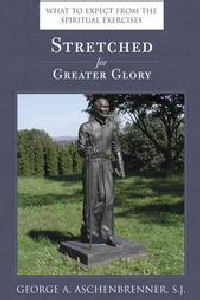
|
Posted August 3, 2005
Book: Stretched for Greater Glory: What to Expect from the Spiritual Exercises Author: George A. Aschenbrenner, S.J. Loyola Press, Chicago, pp. 213 An Excerpt from the Jacket:
Fr. Aschenbrenner contends that our experience of the Spiritual Exercises will be richer if we have a solid grasp of their logic and direction. He offers straightforward commentary on the Exercises, along with the passionate conviction that a knowledgeable engagement with them will open our hearts to God and to generously serving others. An Excerpt from the Book: The Spiritual Exercises is a little book with an explosive potential . . . . The Exercises as we have it was born in the experience of Ignatius during a ten-month stay in 1523 at Manresa, a town in eastern Spain. But that Manrresan experience was foreshadowed in earlier parts of is life, especially his recuperation from a war wound in the family castle at Loyola. The radical reorientation of Ignatius’s life had explosive results, but the upheaval was quiet and unobserved for the most part, rumbling through some deeply held convictions in his own heart. A gusty soldier unaccustomed to much introversion and whose rally cry had been heard in many a battle, Ignatius faced a lengthy period of inactivity during his recovery from a leg wound suffered in a battle with the French. Time stared him in the face and waited on him like an unwelcome guest. With nothing else to do, he began to read and reread what was available: Ludolph of Saxony’s Life of Christ and The Golden Legend, a book of lives of saints. With a thoroughness, determination, and hunger for the heroic that he had brought to his military exploits, Ignatius conquered these two readings. His reading was more than a time filler. Despite his customary attraction to fanciful, romantic subjects, he became absorbed in the religious dimension of is reading. These two books introduced him personally to Jesus Christ as never before, and his heart glowed with the possibility of a relationship so personal as to point toward a whole new way of living. This soldier’s attention, usually focused outward to observe any suspicious movements of the enemy, now, in the solitary confinement of recuperation, turned inward. With a sensitivity at first not fully appreciated, but which later puzzled, amazed, and instructed him, Ignatius began to notice the glow in his own heart. In the examples of the lives of the saints, he saw another type of heroism: he saw how far the love of God in Jesus could stretch people. An ardor stirred his own heart, a fire of desire for heroic deeds for God that would match, even top, those of the saints. All this was no less exciting than his military exploits. In fact, soldiering for Jesus seemed even more important and exciting. During those ten months of recuperation, Ignatius knew is life had decisively shifted. A whole new dimension of inner sensitivity and personal insight, together with quiet determination, had opened for him. The pieces of his life would never fit together again the way they had for almost thirty years. Although he had much yet to learn, he was concerned about preserving what he had already gained, so he turned to a former pastime: writing. In his elegant penmanship, he began to record passages of his reading that were moving his heart so persuasively. His great delight in reading the Life of Christ led him to copy out three hundred pages in his own writing. Over time these ruminations and jottings gave birth to the Spiritual Exercises. The book was the result of years of reflection on this experience while the radical conversion continued to have its effect on him. For about twenty years he carefully honed the wording of his experience and its implications. Ignatius knew he could not force this life-changing experience on anyone else, but he was eager to do all that he could to provide an opportunity for others. In his little book he sketched out a program that would allow others to have the same experience that had brought him into the truth and wise intimacy of a new life. The Exercises is surely not a simple cookbook, but it does include a recipe for an experience of God’s love that never leaves a human life unchanged. It facilitates an interpersonal encounter in love that centers a person in God and generous service. When Ignatius’s little book is separated from his experience, it loses its vigor and orientation. Reduced to words on a page, it can mislead, confuse, and frustrate. In order to avoid this danger, I will often describe the dynamics of the Exercises in terms of Ignatius’s own lived experience. Table of Contents: 1. Ignatius’s Spiritual Exercises and the Word of God 2. Preliminary profound practicalities 3. A glorious foundation 4. A forgiven sinner: awed in gratitude 5. Readied for wise loving 6. A school of discipleship 7. A cosmic confrontation 8. Choosing and loving always for God’s glory 9. A compassionate joy beyond any disappointment 10. Daily life: gratefully serving God in all 11. Methods of praying and some rules 12. Discernment of spirits in the Exercises 13. A more probing discernment |
|
